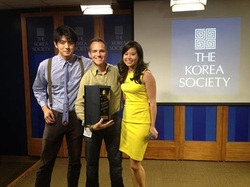
I am very flattered that so many people asked me for a copy of the speech I gave. Here it is:
Welcome to the 72 Hour Shootout Launch Party! As many of you know, this is the 10th year anniversary of the 72 Hour Shootout but it is also another and even more significant anniversary. Today also marks the 70th anniversary of D-Day and I'd like to take a moment to remind everyone of the tens of thousands of Asian Americans who served the US Military in WWII and of the fact that Asian Americans have been serving in the US Armed Forces since the War of 1812. Please join me in taking a moment of silence to remember all those great women and men of all colors who fought for our rights, our liberty, our happiness.
[moment of silence]
Thank you. On behalf of myself – and for those of you who don’t know me, I’m Jennifer Betit Yen, the president of the Film Lab-and on behalf of the Shootout Coordinator Justin Lee and all the Film Lab team, we are ecstatic to have you here ready to write the next chapter in diverse and cutting edge film and television!
I’m going to begin by asking you all to make some superficial assumptions. Take a good look at the person beside you or, if you know the person beside you, the person in front of or behind you. Pick someone you don’t know. Without speaking to them, make an instant decision in your own head about what you think their NATIONALITY is. Note: I didn’t say their RACE or their ETHNIC background; I said their nationality – in other words, what country are they a citizen of?
OK, now hold those thoughts. I’m going to tell you my nationality. I am a dual citizen of two countries. Can you guess them? I’m a citizen of the United States and of…Ireland. I define myself first and foremost as an American. My parents are also Americans – they were both born and raised in the United States. My racial background is Eur-Asian. My mother is Caucasian and my father is of Asian descent. Over my life, many of my fellow Americans have looked at my face and asked me what my nationality is – as though a person who is of any race other than 100% Caucasian is default presumed NOT to be an American. Does that happen to any of you? Raise your hands. Does it bother any of you? Can I see some hands?
OK. Now, I’m also an actor – a career in which we’re judged superficially all the time – but now I am combining acting with producing and all you actors here who are competing in the Shootout are doing the same thing and that gives us POWER. It gives us the power to advocate and cast in a very diverse way; to try to ensure that default casting isn’t white, but rather “colorblind.” The idea is that, in contemporary American piece, any character could be any color – of any racial background – because this is the USA – a diverse and cosmopolitan country made up of people of multiple racial backgrounds. So, it’s your talent and not your color that gets you the role. Colorblind.
But is being “colorblind” a good thing? Is it even possible?
Let’s go back to my 1st question to you: when you guessed the nationality of a stranger near you. You don’t have to say anything or raise your hands, but be honest with yourselves. Did race play a part in your guess?
One of the reasons that I and the Film Lab advocate film and television celebrating, through diverse casts and crews, the diversity of the US is because perception becomes reality. Perception is important. When mainstream media portrays Asian American men as only asexual wimps and Asian American women only as Geisha girls or dragon ladies; African American men as thugs and criminals, Latina women as loud, promiscuous and unable to control their emotions; Middle Easterners as terrorists, it creates a widespread perception that, at some level, those characterizations are actually true, are actually real. That makes it that much more important for people like you and me to create positive perceptions of diversity and people of color for the mainstream; in doing so, we reinforce a perception that color is good; that it’s American.
So, let’s go back to my original statement about colorblind casting, writing and producing. Is it possible? Is it even desirable?
This year, our TENTH ANNUAL SHOOTOUT COORDINATOR Justin Lee, who is nothing if not brave and outspoken, said NO. Justin said we can’t be colorblind because our color – or colors – make us who we are; not innately; but through the impact of the way our society treats us as a result of those colors. That treatment then shapes – both consciously and unconsciously – our views of not just ourselves, but of others. As Supreme Court Justice Sotomayor said:
“Race matters,” she said, “because of the long history of racial minorities being denied access to the political process…because of persistent racial inequality in the society.… Race matters to a young man’s view of society when he spends his teenage years watching other tense up as he passes.… Race matters to a young woman’s sense of self when she states her hometown and then is pressed, no, where are you really from.… Race matters because of the slights, the snickers, the silent judgments that reinforce the most crippling thoughts: ‘I do not belong here.'"
I suggest to you that the first step towards changing things for the better is to recognize when we’ve bought into that – when we make an assumption based on nothing more than skin color or eye shape – and begin to re-train our own minds Malcolm X once said, “We don’t have to change the white man’s mind. We have to change our OWN minds.” So, back to my original challenge to you – to guess the nationality of a stranger nearby. Such a little thing and yet so so powerful. The 2nd step is THIS. Being here. Telling the stories YOU want to tell. Empowering yourselves.
I put the question to you:
Are you colorblind?
Do You Want to Be?





 RSS Feed
RSS Feed
